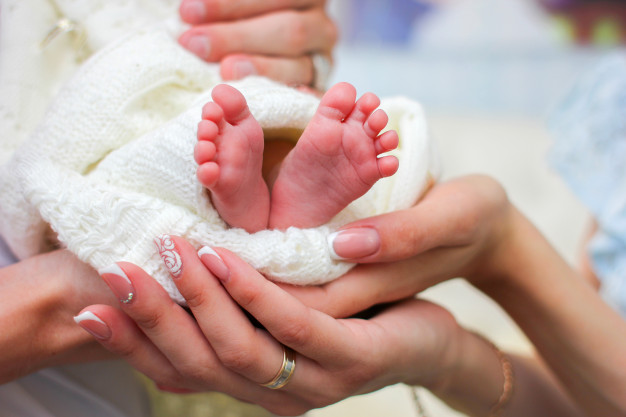Childbirth, in the normal way, should be a purely natural function with very little pain or discomfort to the women concerned. It is so even today that with primitive races. But many civilized women appear to find the bearing of children a task fraught with grave risk and suffering and attended by numerous minor or serious after-effects. This is solely due to wrong dietary habits and a faulty style of living. Healthy mothers will always have an easy time when pregnant.
Pregnancy makes many demands on the prospective mother, the most important being her nutritional needs and those of the unborn child. Studies of the nutrition of women during pregnancy show a definite relationship between the diet of the mother and the condition of the baby at birth.
These studies have also shown that some of the complications of the pregnancy such as anemia, toxemia, and premature delivery may result from a diet inadequate in the nutritional needs of the mother and the baby. The process of childbirth becomes painful mainly due to a large foetus in the womb. This results from an excessive intake of denatured foods such as white flour products, white sugar, refined cereals, meat, and other flesh foods during pregnancy. Other factors contributing to the suffering of the women include lack of exercise, unhygienic habits of living, and restrictive garments.
It is quite wrong to assume that the larger the baby at birth, the healthier it will be. The weight of the baby should be about three to three and a half kg. at birth. If the weight is more than that, delivery will be painful for the mother. Such a child will also be covered with unnecessary fat and watery tissue, which is waste matter and an impediment to health.
A proper diet during pregnancy is the most important factor for not only having painless childbirth but also for giving birth to a healthy baby. The idea of ” eating for two “, which is so prevalent today, is absurd and it leads to overeating, resulting in an unusually, heavy baby. The diet during pregnancy should consist of natural, vital foods and minimum intake of today’s denatured food products.The unborn child will require an adequate amount of organic minerals from its mother for the building of bones and tissues and this can be supplied by natural food such as fruits, raw vegetables, wholemeal bread, and milk, unnatural foods like white bread, sugar, meat, pudding, and pies are very deficient in organic mineral matter and their intake during pregnancy leads to loss and decay of teeth, general debility and other ailments after childbirth.
Pregnancy is rendered more difficult in case of habitual constipation. IN the advanced stage, this is aggravated by the pressure of the enlarged uterus on the bowels. This can be avoided by eating plenty of fresh fruits and vegetables of high fiber content. The expectant mother should drink eight to ten glasses of water. She should not delay going to the lavatory when there is the urge. In severe constipation, a lukewarm water enema may be taken once every week.
The diet for expectant mothers should be planned along the following lines by securing safe and easy childbirth and a healthy child :
Breakfast: Fresh fruit in season or grated raw carrot, or any other raw salad and milk. Prunes or other dried fruit may also be taken, if desired.
Lunch: Steamed vegetables, as obtainable, whole wheat chappatis, and a glass of buttermilk.
Dinner: A good-sized raw salad of any suitable vegetables, sprouted mung beans, whole wheat bread, butter or cottage cheese, and prunes or other dried fruit as dessert.
Besides proper diet, the expectant mother should be given daily dry friction and a cold sponge during the first five or six months of pregnancy. A dry friction bath can be taken with a rough dry towel or with a moderately soft bristle brush. If a brush is used, the procedure should be as follows: take the brush in one hand and begin with the face, neck, and chest. Then brush one arm, beginning at the wrist and brushing towards the shoulders. Now stoop down and brush then the ankle and leg. Then do the other foot and leg and next to the hips and certain portion of the body. Continue brushing each part until the skin is pink.
Use the brush quickly backward and forward on every part of the body. If a towel is used, it should be fairly rough, and the same process should be followed. This bath excites to increased activity all the functional processes lying at or near the surface of the body.
The cold sponge is taken as follows: wring out a towel in cold water, and rub the whole body in the manner described for the friction bath. If during the process of rubbing the towel becomes too dry, it should be wrung out again.
The expectant mother should also take breathing and other mild exercises. After the sixth month, tepid water may be used for the sponge. Exercises should either be modified or suspended altogether. A good walk should be taken daily right up to the end of the eighth month and all household duties should be performed in a normal way.This will keep the muscles of the womb and pelvis in good condition and will ensure safe and easy childbirth. The exercise should, however, always be well within the capacity of the prospective mother, and all undue strain, worry, or excitement should be avoided.
Recoupment
For a healthy woman, recoupment after childbirth poses no problem. Women among primitive races can rise and go about their duties immediately after delivery. The woman of civilized nations is, however, seldom able to do so. It is customary to keep them in bed for a considerable time after childbirth. It is usually due to abnormal slowness with which the generative organs assume the former position.
As in the case of pregnancy, diet plays an important role in recoupment after childbirth. The diet of the mother for the first two days after confinement should consist of only fresh juicy fruits with some warm milk. A salad with thin wholemeal bread and butter may be added to the diet the next day. The diet may thereafter be extended gradually until it approaches the pre-natal diet outlined above.
The diet should exclude white bread or white flour products, sugar, jam, pastries, puddings, pies, heavy, greasy, and fried foods. Strong tea, coffee, alcohol, condiments, pickles, and vinegar should be strictly avoided.
It is most essential that the baby nurses at the mother’s breast stimulate the production of milk, especially during the critical period following birth. This is important for several reasons. The infant, nursing at the breast, causes the uterus to contract. The contraction of the uterus will help expel any portion of the placenta which may remain following delivery. It will also stop the mother from hemorrhaging. If those mothers who are afraid of losing their figures would try nursing their babies, they would discover their figures improve after childbirth.
Feeding of children
During the first forty-eight hours immediately after birth, the mother’s breasts generally do not produce milk. This is following nature’s plan that the infant should fast during this period. He will not need food and none should be given. All children after this period should be breastfed where possible.
Breastfeeding is the natural and ideal way of feeding the infant. Mother’s milk is pure, fresh, and easily digestible. It helps the child to grow. The child should be given four feeds a day at four-hourly intervals but no feeds should be given during the night. If the child wakes up at night only water should be given.
Babies should be breastfed for at least 8 months as this is nature’s way of providing all the required nutrients during this period. Recent research has shown that the mother’s body can react to infections in the child and the bacteria in the baby’s mouth leads to the production of appropriate antibodies in the mother’s milk.
Breast-fed babies are, therefore, less prone to gastrointestinal and respiratory diseases. If for any reason, it is impossible to breastfeed the child, it should be fed on goat’s milk or cow’s milk, diluted with water, with milk sugar added. The child should not be given artificially prepared, patent, or tinned milk foods. Have a safe and healthy delivery.
written by – The Arbitrary Doctor




